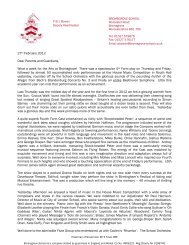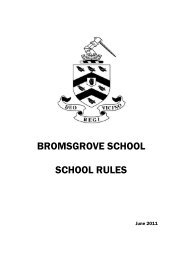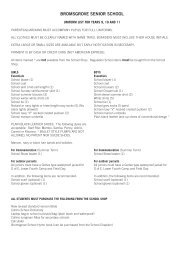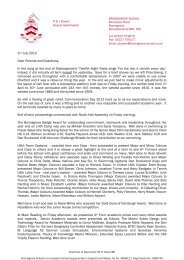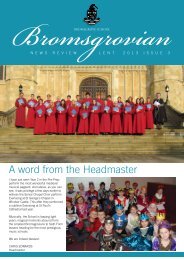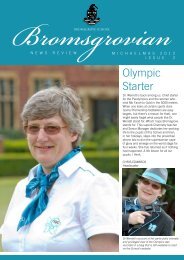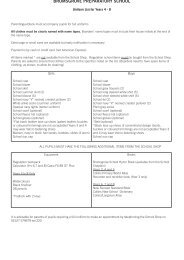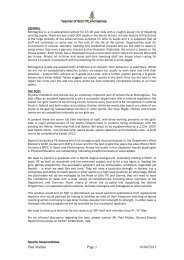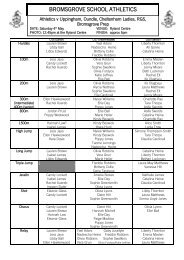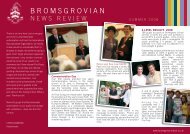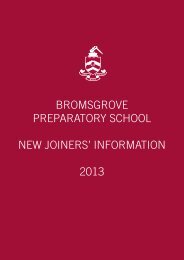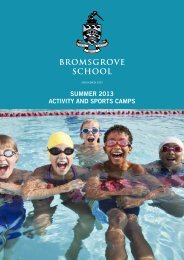Sixth Form Course Booklet 2013 - Bromsgrove School
Sixth Form Course Booklet 2013 - Bromsgrove School
Sixth Form Course Booklet 2013 - Bromsgrove School
Create successful ePaper yourself
Turn your PDF publications into a flip-book with our unique Google optimized e-Paper software.
FACTORS TO CONSIDER WHEN CHOOSING SIXTH FORM COURSES<br />
IB Diploma subjects and A levels cannot be mixed and matched. One route or the other must be followed. Having<br />
first decided which route to follow, you should then consider the following.<br />
1. Your own interests and enthusiasm - you will have to spend more time on each subject than you did for any<br />
subjects at GCSE.<br />
2. Some subjects are very different at <strong>Sixth</strong> <strong>Form</strong> level from what they were like at GCSE level. Normally subjects<br />
are similar no matter whether they are studied within the IB programme or through the A level route (but not<br />
always – English Literature is approached very differently by the two systems).<br />
3. How good you are at the subject.<br />
4. How it fits in with other subjects you are studying. Within the A level route there will, ideally, be some fit<br />
between the subjects being studied. The IB Diploma requires three subjects to be studied at Higher Level and<br />
three at Standard Level, and the breadth of the programme must be maintained.<br />
5. What style of assessment suits you best? IB has some coursework but the majority of assessment comes in<br />
the form of exams at the end of the Upper <strong>Sixth</strong>. A levels have more regular unit exams, with coursework being<br />
important in some subjects.<br />
6. Many feel that pupils should continue with a broad programme of study for as long as possible. The IB caters<br />
for this naturally. A level pupils can maintain breadth if they wish, but some pupils studying A levels will wish to<br />
play to their strengths.<br />
7. How subjects fit in with your possible career choice or suit university entrance requirements.<br />
It is vital that you research subject choice with care. Subject teachers are always willing to give you more information<br />
about subject content. Attend the <strong>Sixth</strong> <strong>Form</strong> <strong>Course</strong> Information Morning and careers talks, and make full use of our<br />
Careers Department, which is staffed throughout the day. Take information from older pupils with a pinch of salt; there<br />
are always those who will complain that a subject is “hard” (perhaps it is for them, particularly if they made a bad<br />
choice and are not suited to it having not researched it properly).<br />
UNIVERSITY ENTRANCE<br />
We strongly recommend that very detailed advice is taken from the Careers Department on this complex subject.<br />
However, several general points are worth stressing.<br />
1. For some university degrees it is not necessary to have studied the subject previously. These subjects include<br />
Economics, Politics, Business, Psychology, Philosophy, Sociology, Computing, Law and Theatre Studies. In fact<br />
there are times when universities may prefer you to study related subjects to the specific one you intend to<br />
read for your degree. For example, some Computing departments prefer candidates to study Mathematics and<br />
Physics rather than Computing, whilst some Economics and Business courses require Mathematics but not<br />
school level Economics or Business.<br />
2. Some subjects are a particular requirement to study another subject at university. These include Chemistry for<br />
entry to Dentistry, Medicine, Pharmacy, Veterinary Science, Chemical Engineering and many top Biology<br />
courses. It is worth noting that in Medicine, Veterinary Science, and Dentistry, there is now enthusiasm for a<br />
non-science subject in addition to Chemistry and Biology. Mathematics and Physics are essential for most of<br />
the top Engineering courses. Biology is seen as very important for Physiotherapy, some Psychology courses,<br />
Nursing Degrees, and Occupational Therapy.<br />
3. Many of the top Modern Languages courses at University require, or prefer, two languages studied in the <strong>Sixth</strong><br />
<strong>Form</strong>.<br />
This list could be virtually endless. We would therefore again like to stress the need for you to take specialist advice at<br />
this stage of the decision making process.<br />
4



